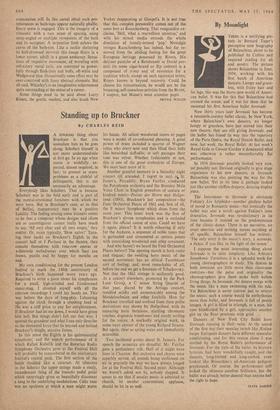Standing up to Bruckner
By CHARLES REID
A STRIKINg thing about Bruckner is that you assimilate him as he goes along. Schubert himself is not more understandable at first go. In an age when music is wishfully ex- pected, almost required, in fact, to present as many problems as a clubful of delinquents, this is not necessarily an advantage.
Everybody likes Schubert. That is because Schubert was in the field early and is part of the mental-emotional furniture with which we were born. But in Bruckner's case, as in that of Bellini, transparency may be a positive liability. The feeling among some listeners seems to be that a composer whose designs and idiom are so unambiguous cannot really have much to say. 'All very clear and all very empty,' they mutter. Or, more typically, 'How naïve!' Turn- ing their backs on Bruckner's Eighth in the concert hall or 1 Puritani in the theatre, they console themselves with tone-row operas or a-thematic melodrames over which they can frown, puzzle and be happy for months on end.
My own conditioning for the present London festival to mark the 140th anniversary of Bruckner's birth happened many years ago. Required to write a piece about his symphonies for a small, high-minded and foredoomed music-mag, I closeted myself with all the relevant recordings I could lay hands on. This was before the days of long-play. Labouring against the clock through a crushing load of 78s was a stiff price to pay for enlightenment. If Bruckner had let me down, I would have given him hell. But things didn't fall out that way. I spotted the grandeur and what I can only describe as the elemental force that lie beyond and behind Bruckner's simple, massive forms.
In this sense the Eighth is his quintessential symphony; and the superb performance of it which Rafael Kubelik and the Bavarian Radio Symphony Orchestra gave at the Festival Hall will probably be remembered as the anniversary festival's central peak. The first section of the finale thudded like a cataract. At climaxes in the Scherzo the upper strings made a steely, incandescent thing of the tremolo pedal point which recurringly gives so beautifully dissonant a tang to the underlying modulations. Cello tone was an opulence at which a man might warm his hands. All salient woodwind staves or pages were a model of co-ordinated phrasing. A great power of brass included a quartet of Wagner tubas who every now and then lifted their bells like burnished daffodils; in soft passages their tone was velvet. Whether fashionable or not, this is one of the great orchestras of Europe. We must hear more of it.
Another grateful memory is a Saturday night concert (ill attended, I regret to say) irk) St. James's, Piccadilly. Bryan Fairfax conducted the Polyphonia orchestra and the Bromley Male Voice Choir in English premieres of cantata or kindred music—Preiset der Herrn and Heligo- land (1893), Bruckner's last composition—the Four Orchestral Pieces of 1862 and, best of all, the F minor Symphony which dates from the same year. This latter work was the first of Bruckner's eleven symphonies and is excluded from the official canon of nine. Could we have it again, please? It is worth rehearing if only for the Andante, a sequence of noble tunes that is garlanded and streamered at certain points with astonishing woodwind and other ornament.
And why haven't we heard the Four Orchestral Pieces before? The opening march is both rustic and elegant; the swelling horn music of the second movement has an ethical Tannhauser sort of feeling; and, most remarkable of all, before the end we get a foretaste of Tchaikovsky. Not that the 1862 vintage is uniformly good. At a concert elsewhere, promoted by the Park Lane Group, a C minor String Quartet of that year, played by the Arriaga consort, rambled mildly and unrnemorably among the Mendelssohnian and other foothills. How far Bruckner travelled and evolved from these polite derivations was shown by Heligoland, with its menacing horn iterations, startling chromatic touches, dogmatic trombones and sturdy writing for the voices. A markedly original work, in some ways abreast of the young Richard Strauss. But again, clear as spring water and immediately accessible.
Two incidental points about St. James's. For speech the acoustics are dreadful. Mr. Fairfax gave a preliminary talk. Half of it might have been in Choctaw. But orchestra and chorus were superbly served, all sounds being cushioned on air in precisely the way we have always longed for at the Festival Hall. Second point. Although we weren't asked not to, nobody clapped. It seems to me that if secular music is admitted to church, its secular concomitant, applause, should be let in as well.






























 Previous page
Previous page